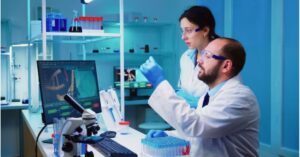In the realm of modern medicine, molecular diagnostics has emerged as a revolutionary approach to disease detection and management. At RapidLaboratory.in, a leading clinical pathology lab in Patiala, we harness the power of molecular testing to provide accurate and timely diagnoses for a wide range of medical conditions.
Understanding Molecular Diagnostics in Pathology
Molecular diagnostics at Health Care Diagnostics centre with Clinical Pathology Lab in Patiala involves the detection and analysis of genetic material, proteins, and other molecular markers to diagnose and monitor diseases. Unlike traditional diagnostic methods that rely on physical symptoms or imaging studies, molecular testing provides insights at the molecular level, enabling precise identification of pathogens, genetic mutations, and biomarkers associated with specific diseases.
What Does a Molecular Diagnostics Lab Do?
A molecular diagnostics lab specializes in performing tests that analyze genetic material, such as DNA and RNA, to diagnose and monitor various medical conditions. These labs utilize advanced techniques and technologies, including polymerase chain reaction (PCR), next-generation sequencing (NGS), and fluorescence in situ hybridization (FISH), to detect and quantify specific molecular targets associated with diseases such as infectious diseases, cancer, genetic disorders, and autoimmune conditions.
What are molecular diagnostic tests examples?
Molecular testing in pathology encompasses a wide range of diagnostic tests that leverage molecular techniques to identify disease-specific markers or mutations.
- PCR-Based Tests: Polymerase chain reaction (PCR) is a widely used technique that amplifies specific DNA sequences, allowing for the detection of pathogens such as viruses, bacteria, and parasites. PCR tests are commonly used to diagnose infectious diseases, including COVID-19, HIV, hepatitis, and sexually transmitted infections (STIs).
- Genetic Mutation Analysis: Molecular diagnostics labs perform genetic mutation analysis to identify mutations or alterations in genes associated with hereditary disorders, cancer, and pharmacogenomics. Examples include testing for BRCA mutations in breast and ovarian cancer, EGFR mutations in lung cancer, and KRAS mutations in colorectal cancer.
- Gene Expression Profiling: Gene expression profiling assesses the activity levels of genes within a biological sample, providing insights into disease mechanisms and treatment response. This technique is commonly used in oncology to predict prognosis, guide treatment decisions, and monitor therapeutic efficacy.
What are the basic principles of the molecular diagnostics tests?
The basic principles of molecular diagnostics tests involve several key steps, including:
- Sample Collection: Molecular testing begins with the collection of biological samples, such as blood, tissue, saliva, or urine, from the patient.
- Nucleic Acid Extraction: The next step involves isolating and extracting nucleic acids (DNA or RNA) from the collected samples using specialized techniques.
- Target Amplification: Molecular tests amplify specific DNA or RNA sequences of interest using techniques such as PCR or reverse transcription PCR (RT-PCR). This amplification step increases the sensitivity of the test, allowing for the detection of low levels of target molecules.
- Detection and Analysis: Finally, the amplified DNA or RNA targets are detected and analyzed using various methods, such as gel electrophoresis, DNA sequencing, or fluorescence-based assays. The results of the molecular test are interpreted by trained laboratory professionals and used to make diagnostic or prognostic assessments.
Advantages of Molecular Diagnostics
One of the key advantages of molecular diagnostics is its high sensitivity and specificity, allowing for the detection of disease markers even at low concentrations. This enhanced sensitivity enables earlier detection of diseases, facilitating timely intervention and treatment. Additionally, molecular tests can provide valuable information about disease prognosis, treatment response, and the presence of drug-resistant mutations, helping healthcare providers tailor therapies to individual patients’ needs for improved outcomes.
Applications Across Medical Specialties
Molecular diagnostics has applications across a wide range of medical specialties, including infectious diseases, oncology, genetic disorders, and pharmacogenomics. In infectious diseases, molecular tests play a critical role in identifying pathogens, determining antibiotic resistance patterns, and tracking disease outbreaks. In oncology, molecular profiling helps guide treatment decisions, identify targeted therapies, and monitor disease progression. Furthermore, molecular diagnostics can provide valuable insights into genetic predispositions, allowing for proactive management of hereditary conditions and personalized medicine approaches.
Continued Innovation and Advancement
The molecular diagnostics at Clinical Pathology Lab in Patiala is continually evolving, driven by ongoing research, technological advancements, and the growing demand for personalized medicine. Emerging technologies such as digital PCR, next-generation sequencing (NGS), and CRISPR-based assays hold promise for further expanding the capabilities of molecular testing. These innovations have the potential to revolutionize disease diagnosis, monitoring, and treatment, paving the way for more precise and effective healthcare interventions.
Accessibility and Affordability At Clinical Pathology Lab in Patiala
As molecular diagnostics technologies become more advanced and widespread, they are becoming increasingly accessible and affordable to patients. Many healthcare facilities, including RapidLaboratory, offer a wide range of molecular testing services at competitive prices, making them accessible to individuals across diverse socioeconomic backgrounds. This accessibility democratizes access to cutting-edge diagnostic tools and empowers patients to take proactive steps towards managing their health and well-being. At RapidLaboratory.in, we are committed to providing high-quality molecular diagnostics services that are accessible, affordable, and tailored to meet the unique needs of our patients in Patiala and beyond. Trust us to be your partner in precision medicine and personalized care, delivering accurate and timely diagnoses to improve health outcomes and enhance quality of life.
In summary, molecular diagnostics plays a crucial role in modern pathology, offering precise and personalized approaches to disease diagnosis and management. At RapidLaboratory, we are committed to providing cutting-edge molecular testing services to our patients in Patiala and beyond. Contact us today to learn more about our molecular diagnostics capabilities and how we can help you achieve optimal health outcomes. Trust us to be your partner in precision medicine and personalized care.




